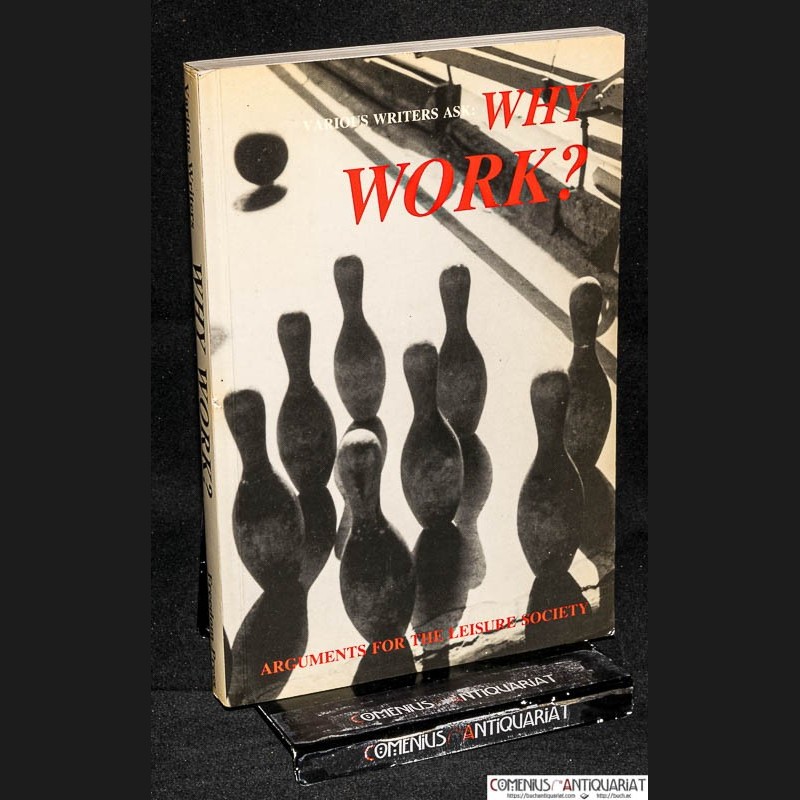Richards, Vernon [ed.],
Why Work? Arguments for the Leisure Society. 3rd ed. London: Freedom Press, 1990. 210 Seiten mit Abbildungen, z.T. auf Falttafeln. Broschur. 298 g
* Beiträge von B.Russell, W.Morris, G.Woodcock, C.Berneri, I.Edwards, D.Pym, C.Harper, C.Ward, L.Gibbard, W.H.Davies, J.Hewetson, P.Kropotkin, T.Gibson, G.Leval, A.Heckscher. - Umschlag etwas lichtrandig / gebräunt.
Bestell-Nr.156195 | ISBN: 0 900384 25 5
Richards |
Oekonomie |
Soziologie |
Anarchismus |
Erwerbstaetigkeit |
Arbeitswelt |
WHY WORK?
ARGUMENTS FOR THE LEISURE SOCIETY
Third printing 1990
The title of this collection by various writers, past and present, is meant to be provocative. What this volume does not attempt to do is to solve the problems of capitalism which can only be solved by abolishing the system of production for profit and putting in its place production for needs. Here the distinction is made between work and employment, between useful work and useless toil, between pleasurable work and boring, well-paid, useless employment.
The contributors to this volume range from William Morris with his ever topical essay on Useful Work versus Useless Toil which was first published more than a hundred years ago, new translations of Kropotkin's Wage System and Camillo Berneri's The Problem of Work, to contemporary writers who all draw the same conclusions as Lewis Mumford in Technics and Civilization (now available as a FREEDOM PRESS title) when he declared more than fifty years ago: "No working ideal for machine production can be based solely on the gospel of work; still less can it be based upon an uncritical belief in constantly raising the quantitative standard of consumption. If we are to achieve a purposive and cultivated use of the enormous energies now happily at our disposal, we must examine in detail the processes that lead up to the final state of leisure, free activity, creation."
CONTENTS
Leisure W.H. Davies
Why Work? Editor's Preface
Call of the Wild Les Gibbard
1. INTRODUCTION
In Praise of Idleness Bertrand Russell Useful Work versus Useless Toil
inside front cover 5 8
2. PROBLEMS AND PLEASURES OF WORK
Tyranny of the Clock George Woodcock Why Work? S.L. Lowndes The Problem of Work Camillo Berneri The Art of Shovelling Ifan Edwards Measuring Misery John Hewetson The Wage System Peter Kropotkin "Who will do the Dirty Work?" Tony Gibson
3. ALTERNATIVES AND FUTURES
Reflections on Utopia S.F. Collectives in Spain Gaston Leval Significance of the Self-Build Movement Leisure in America August Heckscher The Other Economy as a Social System Denis Pym Visions: 6 drawings by Cliff Harper. Commentary by Colin Ward
4. PRODUCTION FOR USE VERSUS PRODUCTION FOR PROFIT
Vernon Richards
1. Reflections on Full Employment 2. Supply & Demand 3. Capitalism or the Survival of the Richest 4. More Parasites than Workers 5. Workers Wake Up! 6. Wasted Manpower 7. Nationalisation of Leisure 8. A Bit of Indigestion 9. Financial Crisis 1961 10. Blessings of Prosperity 11. Unemployment Again _92 12. Redundancy & Revolution 97 13. "Abundance may Compel Social Justice" 201 14. The Wind of Small Change 205 15. Time is Life 209
We know what we should do, but we do not do it. We prefer to remain not so much in our outer darkness, for the lights of wisdom blaze round us; but in a bemused euphoria of a material 'progress' that offers mankind a high standard of living in exchange for his spiritual freedom.
HERBERT READ
( The Truth of a few Simple Ideas 1967)
Let us take supply-side theory at its face value, however modest that may be. It holds that the work habits of the American people are tied up irrevocably to their income, though in a curiously perverse way. The poor do not work because they have too much income; the rich do not work because they do not have enough income. You expand and revitalise the economy by giving the poor less, the rich more.
J.K. GALBRAITH
The Rich get even Richer (Observer 17/1/82)
I was interested to read the article on wealth in last week's Sunday Times as I recently totalled the worth of all my possessions if they were sold. It came to about £400. The most expensive item was a radio-cassetted recorder (£70) followed by my tent (.£65) and rucksack (.£50). I live comfortably in a bed-sit and work in a London hotel. I would not fit anywhere on your wealth chart, but I certainly do not feel poor. I consider poor to be the countries of the Third World, where to have a day's food is to be rich. I think it is a rather sad comment on our society that a person who owns £10,000 worth of possessions is considered "fairly poor" by 32 per cent of your survey.
DEREK BAKER
How do you test wealth. Letter in S. Times 1982




 Privacy
Privacy
 Shipping Costs
Shipping Costs
 Google Mail
Google Mail
